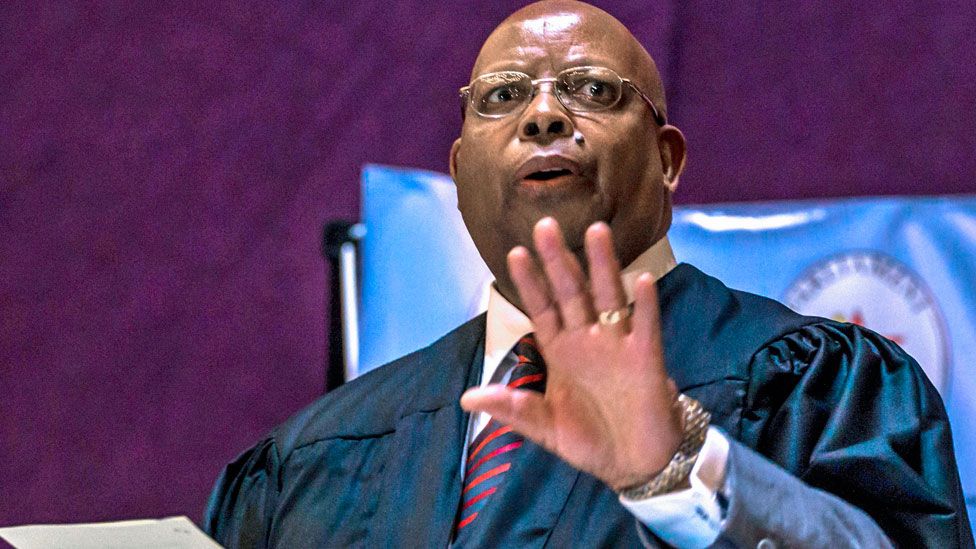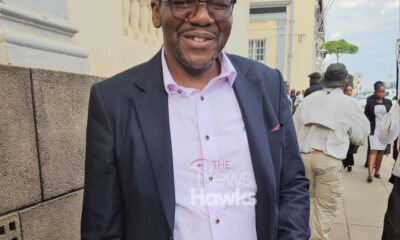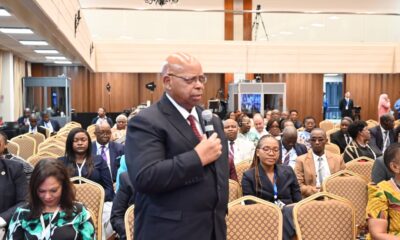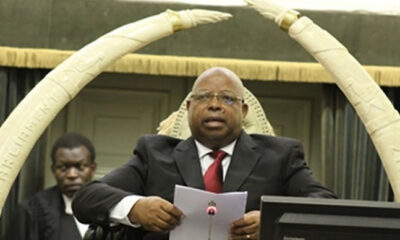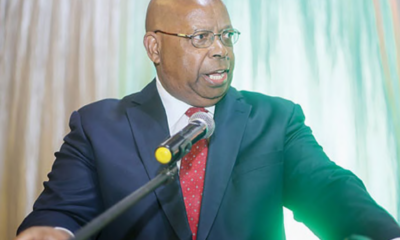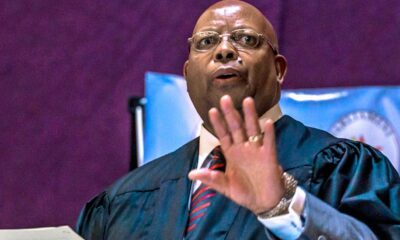BRENNA MATENDERE
SPEAKER of Parliament Jacob Mudenda has come under the spotlight after he blocked opposition CCC lawmaker Gladys Hlatywayo from rising on a point of national interest to ask about President Emmerson Mnangagwa’s diplomatic gaffe in St Petersburg, Russia.
During a meeting with Russian President Vladimir Putin, Mnangagwa described neighbouring Zambia as an American client state – an accusation that has fueled tensions between Harare and Lusaka.
Mnangagwa’s impolitic remarks suggested Zambia and Malawi are satellite states of the United States.
This exacerbated the discomfort between Lusaka and Harare after they collided after Zimbabwe’s fraudulent and disputed general elections last August.
Zambia’s former vice-president Nevers Mumba led a Southern African Development Community (Sadc) observer mission which concluded that the polls were not free and fair.
On Mnangagwa’s recent Russia gaffe, Hlatywayo rose to raise the issue of huge public interest in Parliament on a “point of national interest”.
In her contribution, Hlatywayo, who is in charge of the CCC’s foreign affairs portfolio and was a member of the African Caribbean Pacific-European Union delegation until Mudenda removed her, said: “I rise on a point of national interest. Given that Zimbabwe is assuming the role of Sadc chair this August, I urge the executive arm of government from making comments that unsettle the country’s neighbours.
“This is in light of the widely published comments that Zambia and Malawi are posing a security threat to Zimbabwe through association with the United States.”
As Hlatywayo was still talking, there were some inaudible interjections. Mudenda jumped in:
“Order, order! I think there was a point of order that side.”
With those remarks, Mudenda brought in Zanu PF Rushinga MP Tendai Nyabani:
“Honourable members should distinguish what are national, regional and international issues. I thank you.”
Relieved, Mudenda, who is also Zanu PF’s treasurer-general, then said: “Thank you very much, honourable Nyabani. Honourable Hlatywayo, the area of foreign affairs in terms of bilateral or regional relations is a matter of the executive to deal with at all times.
“If there are any issues with the executive, enda ikoko (go there). Do not interrupt my ruling. It is unbecoming, honourable member.
“I was saying this is a no-go area. Where you have issues that relate to bilateral or multilateral relations between or among states, those are dealt with at the level of the executive.”
Academic and publisher Ibbo Mandaza said Mudenda’s actions are undermining Parliament and diminishing its stature.
“Are we reducing the proverbial ‘august House’ into a complete farce, not to mention the background of the same having been depleted by recalls of dozens of parliamentarians in blatant disregard for the people’s votes and the consequent decimation of whatever remained of the formal opposition in Zimbabwe?” Mandaza queried.
Mudenda’s actions are viewed by critics as incorrect because there is a parliamentary portfolio committee on Foreign Affairs and International Trade which deals with issues such as Mnangagwa’s St Petersburg diplomatic indiscretion.
The committee deals with Zimbabwe’s relations with other countries, moreso neighbours, and trade matters.
While Parliament faces hurdles in contributing to the formulation and execution of Zimbabwe’s foreign policy, the constitution is clear:
“All institutions and agencies of the state and government (in Zimbabwe) at every level are accountable to Parliament.”
In terms of section 116 of the constitution, the legislature consists of Parliament and the President. The President is part of the legislature in his capacity as head of state who holds the public seal and accordingly must assent to Bills passed by Parliament before they become law.
The executive, particularly the President, is accountable to Parliament. While it is clear Parliament should be involved in foreign policy issues, the executive in Zimbabwe tends to promote de-parliamentarisation of that area, which is what Mudenda supports.
With that mindset, Mudenda blocked Hlatywayo from raising a critical issue which concerns not just Zimbabweans or leaders in Lusaka and Harare but also the whole Sadc region.
It is also an issue of democratic accountability; the executive – Mnangagwa in this specific case – accounts to Parliament, not to himself.
Mudenda, who assisted CCC self-proclaimed secretary-general Sengezo Tshabangu to capture the opposition from Nelson Chamisa and render it readily in service of Zanu PF, last month rescinded opposition appointments of portfolio committees point-persons made in February.
This was to help the pro-ruling party opposition CCC faction to remain in charge of those committees. The appointments were made by a pro-Chamisa CCC faction.
In May, Mudenda and Zanu PF chief whip Pupurai Togarepi ganged up against opposition CCC Harare West MP Joana Mamombe after she asked when the legislature was going to reinstate recalled CCC MPs in line with the Inter-Parliamentary Union (IPU) Committee on the Human Rights of Parliamentarians decision in March.
Mudenda, who aided and abetted the capture of the CCC by Tshabangu, has been complicit in undermining democracy in Parliament, while acting as a gatekeeper for the executive. The legislative arm of the state is mandated by the constitution to exercise oversight on the executive, not to protect it from scrutiny and criticism.
Zimbabwe is a constitutional democracy. It has three pillars of state, namely the executive, the legislature and the judiciary, which derive their existence and authority from the constitution.
For the proper functioning of government, the three pillars of state, though respecting the principle of the separation of powers by maintaining their independence from one another, coordinate, interface and play complementary roles in national governance.
The executive runs the administration of the state, makes policies and enforces laws. Parliament makes laws and the judiciary interprets laws, that is the constitution and statutes.
That is how Zimbabwe should work as a constitutional democracy.
